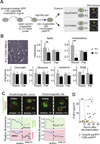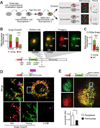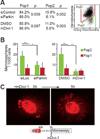Stem cells. Asymmetric apportioning of aged mitochondria between daughter cells is required for stemness
- PMID: 25837514
- PMCID: PMC4405120
- DOI: 10.1126/science.1260384
Stem cells. Asymmetric apportioning of aged mitochondria between daughter cells is required for stemness
Abstract
By dividing asymmetrically, stem cells can generate two daughter cells with distinct fates. However, evidence is limited in mammalian systems for the selective apportioning of subcellular contents between daughters. We followed the fates of old and young organelles during the division of human mammary stemlike cells and found that such cells apportion aged mitochondria asymmetrically between daughter cells. Daughter cells that received fewer old mitochondria maintained stem cell traits. Inhibition of mitochondrial fission disrupted both the age-dependent subcellular localization and segregation of mitochondria and caused loss of stem cell properties in the progeny cells. Hence, mechanisms exist for mammalian stemlike cells to asymmetrically sort aged and young mitochondria, and these are important for maintaining stemness properties.
Copyright © 2015, American Association for the Advancement of Science.
Figures




Comment in
-
Adult stem-like cells exclude "older" mitochondria.Cell Metab. 2015 May 5;21(5):658-9. doi: 10.1016/j.cmet.2015.04.023. Cell Metab. 2015. PMID: 25955200 Free PMC article.
-
Stem cells: Asymmetric rejuvenation.Nature. 2015 May 21;521(7552):296-8. doi: 10.1038/521296a. Nature. 2015. PMID: 25993956 No abstract available.
References
-
- Rossi DJ, et al. Deficiencies in DNA damage repair limit the function of haematopoietic stem cells with age. Nature. 2007 Jun 7;447:725. - PubMed
-
- Coumailleau F, Furthauer M, Knoblich JA, Gonzalez-Gaitan M. Directional Delta and Notch trafficking in Sara endosomes during asymmetric cell division. Nature. 2009 Apr 23;458:1051. - PubMed
-
- Fichelson P, et al. Live-imaging of single stem cells within their niche reveals that a U3snoRNP component segregates asymmetrically and is required for self-renewal in Drosophila. Nature cell biology. 2009 Jun;11:685. - PubMed
-
- Aguilaniu H, Gustafsson L, Rigoulet M, Nystrom T. Asymmetric inheritance of oxidatively damaged proteins during cytokinesis. Science. 2003 Mar 14;299:1751. - PubMed
Publication types
MeSH terms
Grants and funding
LinkOut - more resources
Full Text Sources
Other Literature Sources
Medical
Research Materials

